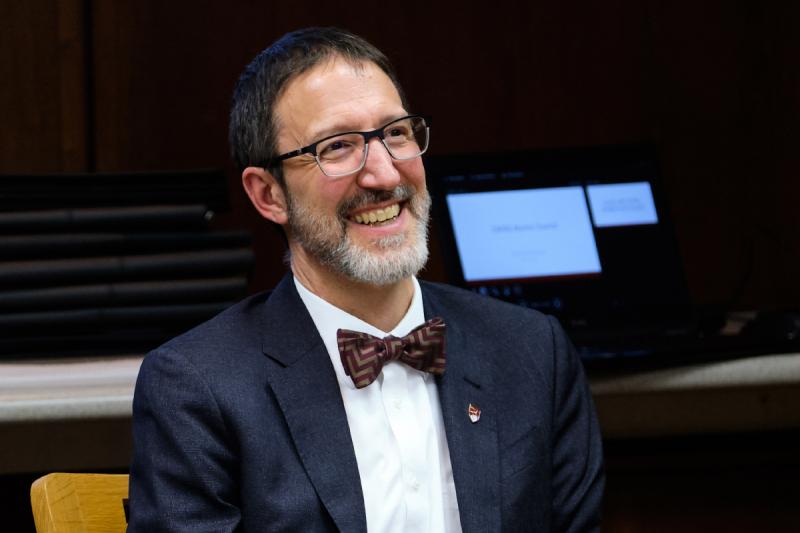From the Dean’s Office: Why a Liberal Arts Education Matters

This article originally appeared in the spring issue of University of Denver Magazine.
At colleges and universities everywhere, the arts, humanities and social sciences have been on the chopping block, just when we need them the most. But at the University of Denver, support for and participation in these disciplines has remained strong. The University of Denver Magazine asked alumnus Daniel McIntosh (BA ’87), dean of the College of Arts, Humanities & Social Sciences (CAHSS), to share his thoughts about how and why these disciplines make up an important part of the University’s Four-Dimensional Student Experience, which provides for advancing intellectual growth, exploring character, promoting well-being, and pursuing careers and lives of purpose. Effective July 1, McIntosh will conclude his seven-year term as dean and return to his faculty position in the Department of Psychology, where he will continue his research on emotions and the psychology of religion.
For the benefit of skeptics, make your best “elevator speech” for a robust education in the CAHSS disciplines.
In CAHSS, we study people — what they create and believe, how they think and behave, what they have done and will do. This helps students interact effectively with others, lead teams and organizations, and address the world’s most difficult problems. CAHSS majors learn to define and solve complex problems, work in diverse groups, explore new areas and communicate well. It’s no surprise that Inc. magazine reported that over time a liberal arts degree increases in economic value relative to others. Moreover, last year powerfully reminded us how essential it is for people to create and to experience art, poetry and performances. Creation, understanding, growth, connection — they are critical to individuals and society.
At DU, your tenure as dean is credited with an impressive commitment to programs and initiatives. Did your own time as a DU undergraduate inform your approach to the student experience?
Absolutely. DU faculty inspired curiosity and worked alongside us students to teach rigorous ways to identify important questions and to find and use valid answers. Staff and faculty provided extraordinary support for academic and personal growth. I became engaged in a community that cared about each other and the world. Wanting to share that is why I became a professor and wanted to work at DU, and it has framed my work as dean.
Casual observers of higher education are more likely to link innovation with business, engineering or the natural sciences than with the CAHSS disciplines. Are they wrong?
Too narrow. Ties among creativity, diversity and innovation are well established. Innovation thrives at margins and intersections, when deep knowledge and broad connections allow thinking about problems in new ways and support working with others who hold different perspectives. CAHSS teaches this. CAHSS students also benefit from opportunities across other DU programs; students in other disciplines all take classes and many earn second majors in CAHSS. This is why innovation flourishes across DU.
CAHSS as a source of innovation is embodied in the Center for Innovation in the Liberal and Creative Arts (CILCA). For example, the multidisciplinary Praxis Initiative immerses students in the theory and practices of art and technology, helping them apply their learning in public-facing applications. The Clinic for Open-Source Arts, known as COSA, contributes to the public good by creating open-source digital tools for creative industries, with a focus on collaborating with members of underrepresented communities.
One of the many things your deanship will be remembered for is the launch of programs that enhance student opportunities. The Keystone Experience comes to mind. How do these address our times and student needs and expectations?
In CAHSS, students apply their education to complex situations in ways that integrate theory and practice. The cross-quarter intertwining of learning and doing in Keystone Experiences prepares students to use their CAHSS education later and enhances their experience at DU. For example, the Casa de Paz Learning Community links courses across disciplines to engagement with adults detained at an immigration detention center. Across departments, students complete multiquarter creative and research projects with faculty. Examples include a student doing interviews in Denmark to develop policy ideas for small business in Colorado and another interning at a nonprofit advancing a deep understanding of global affairs. Wanting to apply what they learn is characteristic of DU students; these opportunities mean students get the education they seek and need to have an impact throughout their lives.
Community engagement is one of the key pillars of DU’s strategic plan, DU IMPACT 2025. How have the CAHSS disciplines supported that?
Community engagement is integral to our culture and thus evident throughout CAHSS. The Casa de Paz and COSA programs in CILCA are two examples. The DU Prison Arts Initiative, which brings theater and the arts to incarcerated individuals, is another. Across departments, students in individual courses engage with the community and with faculty whose scholarship and creative work are deeply connected with community partners.
Looking back on your tenure as dean, what you are you most proud of?
I’m proud of what the students, staff and faculty of CAHSS have accomplished, and I’ve been honored to support them. We’ve become more diverse, expanding opportunities for students to learn about and engage the world. The successful launch of our Critical Race and Ethnic Studies minor enhances our scholarship and educational capacity to meet current and future interests of students and needs of society. I’ve loved collaborating with CAHSS staff, faculty, students, parents and alumni, as well as partners across the University, to develop a unified college at the heart of DU. I can’t wait to continue work as a faculty member in the College as it moves to greater impact and success.


